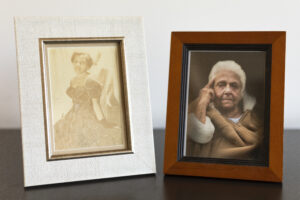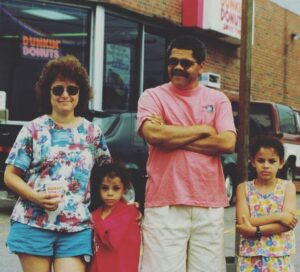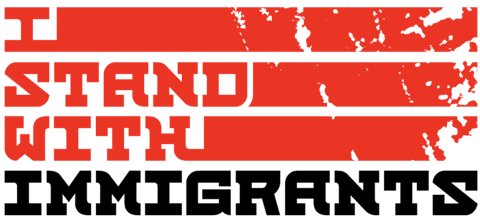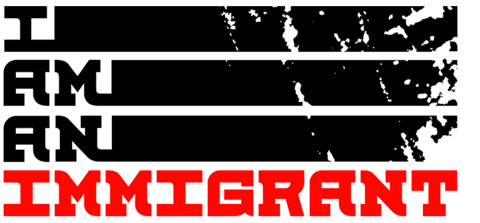Kaytia
Kaytia is a community organizer and Deputy Director of the I Stand with Immigrants Initiative and Partnerships at FWD.us, and daughter of immigrants from Eastern Europe and the Caribbean. On her mother’s side, Kaytia’s family escaped the Nazi occupation and came through Ellis Island. Her father’s ancestors immigrated from Barbados and can trace their roots back to the slave trade. Kaytia grew up in Boston, Massachusetts and lives in Denver, Colorado.
Kaytia’s family, and their stories of immigration to the U.S., are threaded with resilience and strength.
“My father’s side of the family is African-American. His family’s history is a forced immigration story, and they can link their family back to the slave trade in Barbados. On my mom’s side, my grandmother is Jewish and a survivor of the Holocaust.”
 Kaytia’s grandmother was born in Hungary and fled when the Nazis invaded. Her grandmother sought refuge in a boarding house after a U.S. military raid and as it happened, the man who ran the boarding house was an art professor who taught Kaytia’s grandmother how to sculpt. It was a skill that proved extremely useful for her grandmother. When her grandmother arrived at Ellis island she was turned away due to capacity issues, she then went to wait for one year in Cuba where she sculpted to make a living. Eventually, when she did come to the U.S., she started a career as a facial prosthetics specialistic using her knowledge rooted in sculpting education. Kaytia’s own parents would meet decades later while attending college in New York.
Kaytia’s grandmother was born in Hungary and fled when the Nazis invaded. Her grandmother sought refuge in a boarding house after a U.S. military raid and as it happened, the man who ran the boarding house was an art professor who taught Kaytia’s grandmother how to sculpt. It was a skill that proved extremely useful for her grandmother. When her grandmother arrived at Ellis island she was turned away due to capacity issues, she then went to wait for one year in Cuba where she sculpted to make a living. Eventually, when she did come to the U.S., she started a career as a facial prosthetics specialistic using her knowledge rooted in sculpting education. Kaytia’s own parents would meet decades later while attending college in New York.
“From an academic point, I was always into cultural competence, and seeing how that worked while I was living abroad,”Kaytia said as she reflects on what brought her to her role in advocacy work, and her focus on immigration.
“I think that immigration is the pinnacle of that, particularly around diversity inclusion, which is also where I was specializing. From a family perspective, having both Jewish and Black family, I was able to see the barriers that they had to overcome to be successful, and the contributions they were able to make once they overcame those barriers. I think it’s important to give people a chance to contribute back, because for the most part people really go above and beyond in terms of giving back to their communities.”
Though the work she does on immigration policy is more important than ever, it can also take an emotional toll. “I remember maybe a year or two ago, I was doing a huge amount of work with university students. I had a student call me up in tears, he was a DACA recipient, and he had seen an unmarked van and thought it was a check-point. He was panicked he wasn’t going to be able to get home, that his parents wouldn’t be able to come home, and how he might have to explain it to his younger sister, or take care of her, if his parents did get taken. Things that someone should never have to think about. Hearing that from someone who is a college student at my alma mater, it’s really taxing. [You feel] helpless in those situations. We did our best, and we connected him to a lawyer who he could talk to. But you can’t really dissipate that fear.”
Kaytia would like to see lawmakers pursue comprehensive immigration reform, and policies that would extend to all immigrants.

Kaytia with her Mother, Father and sister.
“Oftentimes, you see [negotiations] start to fall apart from trying to include too many policies, but the fact is, we need a comprehensive package that pushes to help as many people as possible. You start to lose the masses when you cherry-pick who you are going to help. I think they need to [create] a legal path for those [immigrants] who are already here in the U.S., make the systems that we have workable for the current economy, and other reforms that are really long overdue.”
Beyond changes to federal immigration policies, Kaytia sees the need for people to come together and share their stories because to her, Immigrant Heritage Month is an opportunity for the community to look beyond political divides and appreciate the diversity and heritage of immigration to the U.S.
“I think no matter where you lie on the political spectrum, it’s important to think about where you’re coming from, where you want to go, and how you can bring people with you. I think it’s really important to build bridges and build community across political, racial, religious, and economic lines. One of the most important opportunities that Immigrant Heritage Month brings is the opportunity to have conversations that you may not have, with people who you may not normally have them with. I think that’s a huge growth opportunity and it’s not to be missed.”
#CELEBRATE IMMIGRANTS
We all know someone with an immigration experience or have an immigrant heritage story of our own. Join us in sharing your story for a chance to be featured on our official channels!


